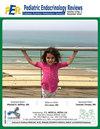Osteoclasts in Health and Disease.
4区 医学
Q2 Medicine
Pediatric endocrinology reviews : PER
Pub Date : 2019-12-01
DOI:10.17458/per.vol17.2019.l.osteoclastshealthdisease
引用次数: 8
Abstract
Osteoclasts are multinucleated, giant cells originating from myeloid hematopoetic stem cells. These are the only cells in nature which can resorb bone. Differentiation of mononucleated osteoclast progenitor cells requires stimulation with M-CSF (macrophage colony-stimulating factor) for the cells to proliferate and survive and with RANKL (receptor activator of nuclear factor kappa B ligand) for differentiation along the osteoclastic lineage to cells which eventually fuse to the mature, multinucleated osteoclasts. Therefore, most hormones and cytokines stimulating osteoclastogenesis do so indirectly by regulating the expression in osteoblasts of RANKL and its inhibitory decoy receptor OPG. Antibodies neutralizing RANKL is a common therapy to inhibit excessive osteoclast formation in diseases such as osteoporosis and malignant tumors with skeletal metastasis. Mature osteoclasts resorb bone by stimulating acid release into the resorption lacunae, followed by proteolytic degradation of bone matrix proteins. Loss-of-function mutations of proteins involved in acidification and proteolysis cause osteopetrosis, a disease with sclerotic bone due to non-functional osteoclasts. Osteoclasts are important for a healthy skeleton by removing damaged bone during remodeling of the skeleton, but are also important for modeling of bone, calcium homeostasis and tooth eruption, and possibly also for glucose and fat metabolism. Loss of bone in inflammatory disease, metastasizing tumors and osteoporosis is due to increased RANKL expression and enhanced osteoclast formation. The present overview aims to summarize how osteoclasts are formed and resorb bone in health and disease.健康与疾病中的破骨细胞
破骨细胞是起源于髓系造血干细胞的多核巨细胞。这些细胞是自然界中唯一能吸收骨头的细胞。单核破骨细胞祖细胞的分化需要M-CSF(巨噬细胞集落刺激因子)的刺激才能增殖和存活,需要RANKL(核因子κ B配体受体激活因子)的刺激才能沿着破骨细胞谱系分化为最终融合为成熟的多核破骨细胞。因此,大多数刺激破骨细胞形成的激素和细胞因子是通过间接调节RANKL及其抑制诱饵受体OPG在成骨细胞中的表达来实现的。抗体中和RANKL是抑制骨质疏松症和伴有骨骼转移的恶性肿瘤等疾病中过度破骨细胞形成的常用疗法。成熟的破骨细胞通过刺激酸释放到吸收腔隙来吸收骨,随后是骨基质蛋白的蛋白水解降解。参与酸化和蛋白水解的蛋白质的功能缺失突变导致骨质疏松症,这是一种由无功能破骨细胞引起的骨质硬化疾病。破骨细胞在骨骼重塑过程中清除受损骨骼,对骨骼健康至关重要,但对骨骼建模、钙稳态和牙齿萌出也很重要,可能对葡萄糖和脂肪代谢也很重要。炎症性疾病、转移性肿瘤和骨质疏松症的骨质流失是由于RANKL表达增加和破骨细胞形成增强。本综述旨在总结破骨细胞在健康和疾病中是如何形成和吸收骨的。
本文章由计算机程序翻译,如有差异,请以英文原文为准。
求助全文
约1分钟内获得全文
求助全文
来源期刊

Pediatric endocrinology reviews : PER
Medicine-Endocrinology, Diabetes and Metabolism
自引率
0.00%
发文量
1
期刊介绍:
PEDIATRIC ENDOCRINOLOGY REVIEWS (PER) publishes scholarly review articles in all areas of clinical and experimental Endocrinology, Diabetes, Nutrition and Metabolism. PER is intended for practicing pediatricians, pediatric endocrinologists, pediatric diabetologists, pediatric gastroenterologists, neonatologists, pediatric gynecologists, nutritionists, sport physicians and pediatricians-in-training.
PER will also publish topics on specific subjects or as proceedings of scientific meetings in the above fields of interest. All articles, whether invited or direct contributions, are peer-reviewed. PER publishes correspondence, book reviews, a meeting calendar and meeting reports.
 求助内容:
求助内容: 应助结果提醒方式:
应助结果提醒方式:


